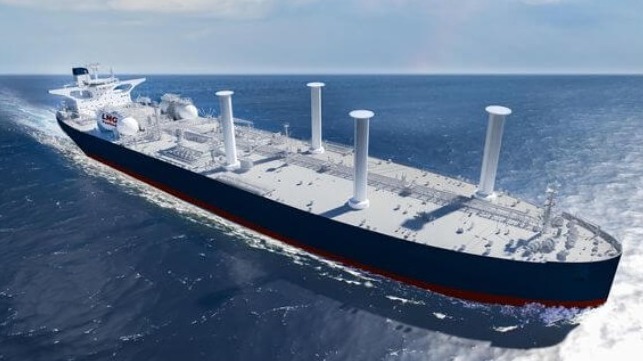Approval for Rotor Sail Design as Hyundai Focuses on Eco-Friendly Ship

South Korean shipbuilding Hyundai Heavy Industries is previewing its design for a rotor sail which is part of the company’s efforts to focus on high-value shipbuilding and meeting the emerging demand for future eco-friendly ships that address demands for reductions in CO2 emissions. The shipbuilder is investing in research and development for new technologies and reports it has made important improvements in the technology currently commercially available.
According to Hyundai, the rotor sail is attracting attention as one of the alternatives to meet the challenges of global environmental regulations because it can reduce fuel consumption and carbon emissions by six to eight percent when mounted on a ship. While the Hyundai version is based on the same science of the Magnus effect, however, the company said that its design “improves the stability of the drive system compared to the belt method of existing commercial products by applying the reduction gear method to the driving part connecting the electric motor and the rotor.”
Called the Hi-Rotor, it was independently developed by Hyundai Heavy Industries, and last week the company reports it obtained an Approval in Principle from the Korean Register of Shipping. This builds on earlier design approvals with further improvements to the technology. Hyundai plans to start demonstrations on land in the second half of this year, and to actively seek product orders based on this design approval.
The rotor design is one of several steps the company is taking to “accelerate the development of new technologies related to eco-friendly ships in preparation for the carbon-neutral era.” They reported that the Hyundai Heavy Industries Group is also accelerating the acquisition of next-generation eco-friendly technologies, such as developing a wing sail wind power auxiliary propulsion device.
“We will take a step forward in the eco-friendly ship market by developing various eco-friendly products such as wind power-assisted propulsion devices as well as eco-friendly fuel propulsion ships such as LNG, ammonia, and hydrogen,” said Joo Won-ho, head of the technology division at Hyundai Heavy Industries.
Ka Sam-hyun, CEO of Korea Shipbuilding & Offshore Engineering, the holding company for Hyundai Heavy Industries, discussed the company’s broader vision in a new interview with The Financial Times. Saying the company is working on multiple technologies, he predicts that LNG will continue to be important in the short term, but that dual-fuel methanol vessels will emerge because of cost advantages. He pointed out that methanol does not require costly cryogenic bunker tanks. He cited analyst data that predicts 50 dual-fuel methanol vessels will be ordered in 2022 up from 19 last year.
Near-term he believes that ammonia remains too expensive and there are still challenges addressing its toxic properties. In time, he thinks technology will make hydrogen and battery-powered vessels possible.
Hyundai is highlighting its success in leading the orders in 2022, including for new technologies and eco-friendly ships. So far, the company has received orders for 41 ships, surpassing 2021’s orders. The company has been especially successful with LNG carriers, receiving 22 orders so far in 2022 as the orderbook for the segment reached a record 103 vessels. They highlighted that the average price of LNG carriers rose about 10 percent so far in 2022 from $210 million to $230 million.

that matters most
Get the latest maritime news delivered to your inbox daily.
Hyundai says its orders are based on the latest technologies, such as the next-generation LNG fuel supply system (Hi-eGAS) and the low-pressure LNG dual fuel engine (ME-GA) and construction performance capabilities.
The South Korean government is encouraging the shipbuilding industry to increase its focus on new technologies and high-value ships. The government has committed to supporting R&D efforts to advance the new technologies by working with the shipyards.
